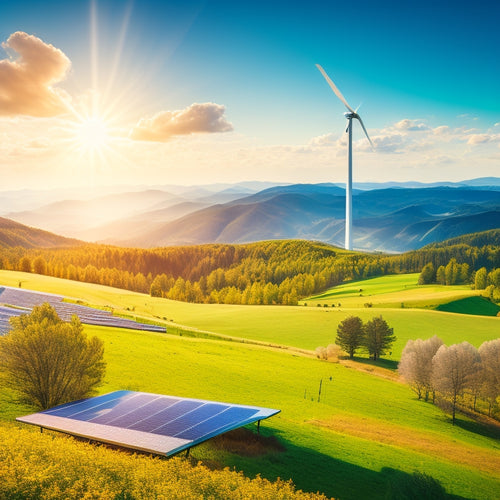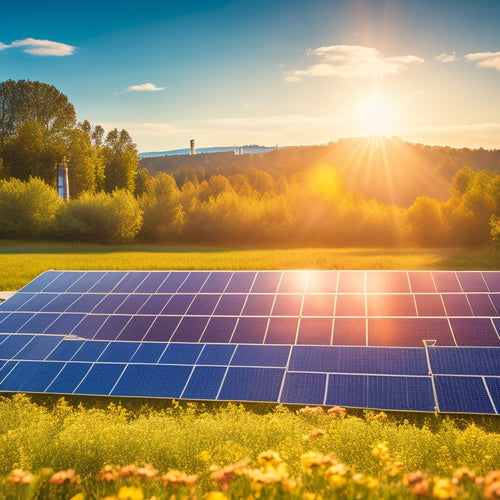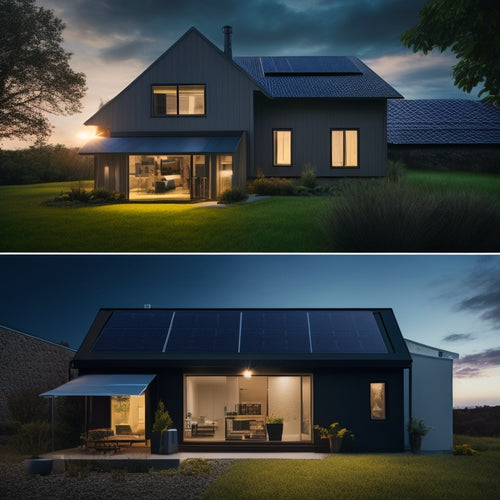
What Energizes Your Home Off-Grid Generators
Share
You're looking to energize your home off-grid, and that's a great move! Your off-grid generators can be powered by a combination of solar panels, wind turbines, and portable generators. Solar power offers a renewable energy source, reducing your reliance on fossil fuels and contributing to a cleaner environment. To guarantee a reliable system, you'll need to take into account off-grid energy system essentials like proper system sizing, wind turbine integration, and deep-cycle batteries. By understanding the key features of portable generators, home energy independence benefits, and battery life expectancy factors, you'll be well on your way to utilizing renewable energy and taking control of your power needs - and there's more to investigate in making this vision a reality.
Key Takeaways
- Solar power and wind turbines can energize your off-grid home, utilizing renewable energy sources and reducing reliance on fossil fuels.
- A properly sized off-grid energy system, including deep-cycle batteries and charge controllers, ensures a reliable power supply during peak energy demands.
- Portable generators with high fuel-to-power ratios, noise reduction features, and regulated power output can provide backup power during low solar periods.
- Energy independence can be achieved through a well-designed off-grid system, offering benefits like energy savings, a decreased carbon footprint, and increased security.
- Battery life expectancy is influenced by factors like depth of discharge, maintenance, charging cycles, and environmental conditions, requiring careful consideration for optimal performance.
Solar Power Advantages Uncovered
Utilizing solar power allows you to tap into a renewable energy source, reducing your reliance on fossil fuels and mitigating climate change. By capturing the sun's energy, you're contributing to a cleaner environment and decreasing your carbon footprint.
Furthermore, solar panel efficiency has improved considerably over the years, making it a more viable option for off-grid energy generation. Renewable energy trends indicate a shift towards solar power, with many countries investing heavily in this technology.
As you consider off-grid generators, solar power is an attractive option, offering a reliable and sustainable source of energy. With advancements in technology, solar power is becoming increasingly cost-effective, making it a smart choice for those looking to reduce their reliance on traditional energy sources.
Additionally, solar battery storage systems, such as lithium-ion batteries, can store excess energy generated by solar panels for later use, enhancing reliability by providing energy during nighttime or outages.
Off-Grid Energy System Essentials
As you consider solar power for your off-grid energy generation, it's equally important to understand the core components that make up a reliable off-grid energy system.
Sizing your system correctly proper system sizing is essential to guarantee you can accommodate peak energy demands and maintain a consistent power supply.
You'll need to integrate wind turbine integration to utilize wind energy, especially during periods of low solar irradiance.
Energy storage solutions, such as deep-cycle batteries, are also vital to store excess energy generated during the day for nighttime use or during periods of low energy production.
A charge controller regulates the flow of energy between your energy sources and storage solutions.
An inverter converts DC power to AC, making it usable in your home.
A monitoring system helps you track your energy production and consumption, confirming your off-grid energy system operates efficiently.
Portable Generator Key Features
When sizing up a portable generator, you're likely to come across a range of key features that can make or break its performance. One vital aspect is fuel efficiency, which directly impacts your energy costs and carbon footprint.
Look for generators with high fuel-to-power ratios, as they'll provide more power while consuming less fuel. Additionally, consider investing in a DIY solar power system, which can provide a clean and renewable source of energy off-grid solar systems and potentially reduce your reliance on generators.
Another important feature is noise reduction, which guarantees a more comfortable living space. Some generators feature advanced noise-dampening technologies or special mufflers to minimize disturbance.
Additionally, consider the generator's power output, voltage regulation, and surge capacity to verify it can handle your energy demands. By evaluating these key features, you'll find a portable generator that meets your off-grid energy needs.
Home Energy Independence Benefits
Embracing home energy independence brings a sense of self-sufficiency and freedom from the grid, allowing you to power your off-grid lifestyle without relying on external energy sources. You'll enjoy significant energy savings and reduce your environmental impact. Here's a breakdown of the benefits:
| Benefits | Description | Impact |
|---|---|---|
| Energy Savings | Reduce your reliance on grid electricity | Lower utility bills |
| Environmental Impact | Decrease your carbon footprint | Contribute to a cleaner environment |
| Increased Security | Power your home during outages | Stay safe and comfortable |
| Quiet Operation | Enjoy peaceful living without noise pollution | Improved quality of life |
| Flexibility | Power your home anywhere, anytime | Unparalleled freedom |
Battery Life Expectancy Factors
You've invested in off-grid generators, but their performance relies heavily on the lifespan of their batteries.
To guarantee your system operates at its best, it's vital to understand the factors that affect battery life expectancy.
Four key factors influence your battery's lifespan:
-
Depth of discharge (DOD): The frequency and depth of discharge greatly impact battery life. A lower DOD can increase lifespan.
-
Battery maintenance: Regular checks and maintenance are important to prevent damage and extend battery life.
-
Charging cycles: The number of charging cycles your battery can handle affects its overall lifespan.
- Environmental conditions: Temperature, humidity, and other environmental factors can impact battery performance and lifespan.
Frequently Asked Questions
Can I Use Off-Grid Generators in Areas With Frequent Power Outages?
You can definitely use off-grid generators in areas with frequent power outages, ensuring power reliability and emergency preparedness; they're designed to kick in when the grid fails, providing a backup power source during outages.
Are Off-Grid Generators Compatible With Smart Home Systems?
You'll be glad to know that many off-grid generators are designed for smart home integration, ensuring seamless generator compatibility with your existing systems, allowing you to monitor and control your energy usage remotely with ease.
Do Off-Grid Generators Require Regular Maintenance Checks?
You'll need to perform regular maintenance checks to guarantee your off-grid generator runs efficiently, typically every 50-100 hours, to maintain generator longevity; neglecting this frequency can lead to premature wear and tear, reducing overall performance.
Can I Install Off-Grid Generators Myself or Do I Need a Professional?
Imagine a DIY enthusiast, Alex, attempting to install an off-grid generator themselves, only to encounter electrical shocks and faulty connections. You shouldn't risk it; instead, hire a professional to guarantee a safe and efficient installation process, considering essential safety considerations like electrical load calculations and grounding.
Are Off-Grid Generators Suitable for Small Apartments or Only Large Homes?
You're wondering if off-grid generators are suitable for small apartments or just large homes? While they're often associated with larger spaces, you can still reap off-grid benefits in an apartment, as they can efficiently provide apartment energy, especially with smaller, quieter models designed for compact spaces.
Related Posts
-

Renewable Energy Solutions to Reduce Your Carbon Footprint
To reduce your carbon footprint, adopting renewable energy solutions is key. Using solar panels or wind turbines can ...
-

Advantages of Solar Generating Systems Over Traditional Energy
Solar generating systems provide several key advantages over traditional energy sources. You'll experience lower long...
-

Cost of Home Solar Battery
You're looking to invest in a home solar battery to reduce your grid reliance, but you're curious about the cost. The...


